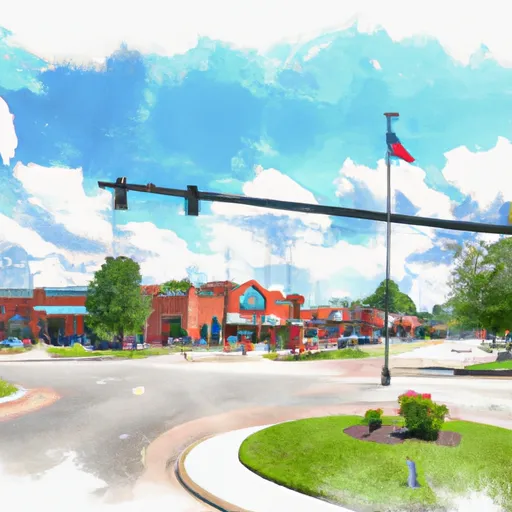-
 Snoflo Premium
Snoflo Premium
Get unlimited access to all our content
With no Ad interruptions! - Start Your Free Trial Login with existing account
Maumelle
Eden Index
Climate
8.0
•
Recreation
7.2
•
Community
4.1
•
Safeguard
6.7/10

Maumelle, Arkansas is a charming city located in Pulaski County, just northwest of Little Rock. The climate in Maumelle is characterized by hot, humid summers and mild, cool winters. Summers have average temperatures in the upper 80s°F (30°C) and can occasionally reach the 90s°F (32°C). Winters are typically mild with temperatures ranging from the mid-30s°F (2°C) to the mid-50s°F (12°C).
The city is situated near the Arkansas River, contributing to its hydrology constituents. The Arkansas River serves as a major water source and offers opportunities for various water-based activities. Boating, fishing, and kayaking are popular recreational options for residents and visitors alike.
Maumelle is also known for its abundant outdoor recreation opportunities. The city has several parks and green spaces where people can enjoy activities such as hiking, biking, and picnicking. Lake Willastein Park and Lake Valencia are two notable outdoor destinations that provide opportunities for fishing, walking trails, and beautiful scenic views.
In conclusion, Maumelle, Arkansas offers a pleasant climate, proximity to the Arkansas River, and a variety of outdoor recreation opportunities, making it an appealing destination for nature enthusiasts and outdoor lovers.
What is the Eden Index?
The Snoflo Eden Index serves as a comprehensive rating system for regions, evaluating their desirability through a holistic assessment of climate health, outdoor recreation opportunities, and natural disaster risk, acknowledging the profound impact of these factors on livability and well-being.
Climate Health Indicator (CHI): 8.0
Maumelle receives approximately
1250mm of rain per year,
with humidity levels near 84%
and air temperatures averaging around
17°C.
Maumelle has a plant hardyness factor of
7, meaning
plants and agriculture in this region tend to thrive during the non-winter months.
By considering the ideal temperature range, reliable water supplies, clean air, and stable seasonal rain or snowpacks, the Climate Health Indicator (CHI) underscores the significance of a healthy climate as the foundation for quality living.
A healthy climate is paramount for ensuring a high quality of life and livability in a region, fostering both physical well-being and environmental harmony. This can be characterized by ideal temperatures, reliable access to water supplies, clean air, and consistent seasonal rain or snowpacks.
Weather Forecast
Streamflow Conditions
Lower Arkansas-Fourche La Fave
Area Rivers
Lower Arkansas-Fourche La Fave
Snowpack Depths
Lower Arkansas-Fourche La Fave
Reservoir Storage Capacity
Lower Arkansas-Fourche La Fave
Groundwater Levels
Recreational Opportunity Index (ROI): 7.2
The Recreational Opportunity Index (ROI) recognizes the value of outdoor recreational options, such as parks, hiking trails, camping sites, and fishing spots, while acknowledging that climate plays a pivotal role in ensuring the comfort and consistency of these experiences.
Access to outdoor recreational opportunities, encompassing activities such as parks, hiking, camping, and fishing, is crucial for overall well-being, and the climate plays a pivotal role in enabling and enhancing these experiences, ensuring that individuals can engage in nature-based activities comfortably and consistently.
Camping Areas
| Campground | Campsites | Reservations | Toilets | Showers | Elevation |
|---|---|---|---|---|---|
| Twin Lakes Military - Camp Beauregard | None | 95 ft | |||
| Loran Site Complex | 30 | 230 ft | |||
| Rapides Coliseum | None | 78 ft | |||
| Stuart | 8 | 153 ft | |||
| Bankston Camp Complex | 15 | 218 ft | |||
| Indian Creek Recreation Area | None | 105 ft | |||
| Crooked Creek Rec Area | None | 103 ft | |||
| Chicot State Park | None | 78 ft | |||
| Rayne RV Park Gossen Memorial Park | 737 | 27 ft | |||
| Evangeline Camp Complex | 14 | 158 ft |
Nearby Ski Areas
Catastrophe Safeguard Index (CSI):
The Catastrophe Safeguard Index (CSI) recognizes that natural disaster risk, encompassing floods, fires, hurricanes, and tornadoes, can drastically affect safety and the overall appeal of an area.
The level of natural disaster risk in a region significantly affects safety and the overall livability, with climate change amplifying these risks by potentially increasing the frequency and intensity of events like floods, fires, hurricanes, and tornadoes, thereby posing substantial challenges to community resilience and well-being.
Community Resilience Indicator (CRI): 4.1
The Community Resilience Indicator (CRI) recognizes that education, healthcare, and socioeconomics are crucial to the well-being of a region. The CRI acknowledges the profound impact of these elements on residents' overall quality of life. By evaluating educational resources, healthcare accessibility, and economic inclusivity, the index captures the essential aspects that contribute to a thriving community, fostering resident satisfaction, equity, and social cohesion.

